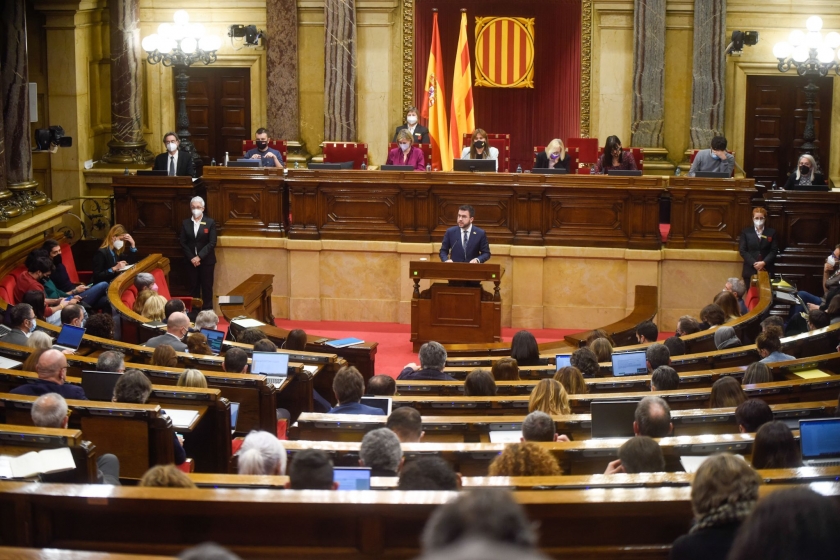
The chamber also approves the incorporation of an emotional welfare expert with every primary healthcare team in the country and inclusion of gender perspective in all mental health policies, at the proposal of Esquerra Republicana and parliamentary majority partners, Junts per Catalunya
The Parliament of Catalonia has urged the Catalan Generalitat government to advance the National Pact for Mental Health through the approval of a joint resolution by Esquerra Republicana, centre-right Junts per Catalunya, left-wing CUP and En Comú Podem, as well as the Spanish Socialist PSC, establishing a national accord during a monographic parliamentary session on mental health convened by President Pere Aragonès.
The Pact is meant to bring together the different agents involved in the field and who play a leading role in the comprehensive and coordinated approach to mental health policy. “We need to have a pact, a tool that serves those affected, including their environment, the professionals, and the general public at all essential stages,” the president argued during the parliamentary debate that began last Tuesday.
The president stressed the importance of addressing an issue that affects one in four persons, and of combating the stigma that surrounds it. He also explained that in the Generalitat Government Budget for 2022 which will be voted on in Parliament next week, “we are taking important steps, allocating over €580 million to mental health and emotional welfare policies,” €80 million more than in the last budget.
With the debate and the votes on the motions for resolution of the various parliamentary groups, “I am convinced that the parties in this House are taking very important steps towards a change of perspective, a paradigm shift” he said, a paradigm shift that Deputy-Speaker of Parliament and member of Esquerra Republicana Alba Vergés defined before the votes during Friday’s session saying that “mental health is no longer an individual diagnosis to be locked away in strict silence, and becomes the purview of society that we must work on together, in an intersectional, holistic manner.”
Specific measures in the fields of health, education, employment and others
“We cannot continue to accept that suicide is the leading cause of death among young people; we cannot continue to accept that 10% of the population is constantly being medicated with antidepressants and sleeping pills. We have to roll up our sleeves, and Esquerra Republicana presents transversal proposals, for everything and everywhere” Ms Vergés assured.
Four of the motions for resolution were presented jointly by Esquerra Republicana and Junts per Catalunya. The first focuses on health and aims to improve treatment of mental health and problems of addiction at primary care centres. It therefore urges the government to incorporate an emotional welfare expert for each Primary Care Team (PCT). There are currently 150 experts assigned to different PCTs, but the government means to add 220 more next year, with the aim of reaching every PCT in the country.

The proposal also calls for reduced prescription of psychotropic drugs, and in turn to increase psychological and psychoeducational care, as well as using alternative methods to mechanical restraint of those with psychomotor agitation whenever possible.
The government will also implement the 2021-2025 Suicide Prevention Plan, which is already being advanced, and which aims to reduce suicide deaths by 15%. Regarding education, the draft urges the Government to analyse the state of emotional welfare and mental health of students at schools in Catalonia and to increase training for educators.
In the field of safety and emergencies, another motion for resolution urges the executive to draw up a training plan for Catalonia’s police force, the Mossos d'Esquadra, and the Fire Services; to implement psychosocial support for Emergency Service workers who are exposed to considerable stress; and to incorporate Guidance Teams (specialized professionals) in all operations in which agents have to deal with persons with highly complex mental illnesses. The administration has begun to deploy some Guidance Teams.
Furthermore, the gender perspective also features in the Esquerra and Junts motions for resolution. The Chamber urges the Government to incorporate a gender and intersectional perspective in its mental health policy, as well as establishing a working group in 2022 to analyse possible links between suicides and gender-based violence.
The last motion for resolution deals with the workplace and urges the government to promote tailored programmes to foster employment of persons with mental health issues. It also calls for the development of protocols for early detection of such cases and to avoid stigmatization by co-workers, as well as reinforcing labour inspections. In addition, it plans to address in particular the needs of working women, young people, temporary workers and migrants, as well as the elderly, the disabled, the chronically and the mentally ill, and others.



